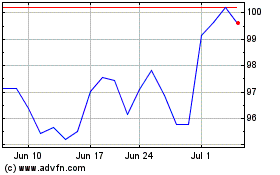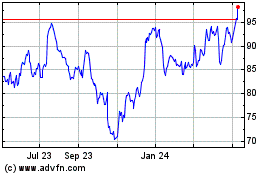Big-Bank Chiefs, Democrats Spar at House Hearing
April 10 2019 - 5:27PM
Dow Jones News
By Andrew Ackerman and Lalita Clozel
WASHINGTON -- The heads of seven of the largest U.S. banks
sparred with House Democrats on Wednesday, arguing the financial
system is now much safer than during the last joint testimony a
decade ago in the depths of the crisis.
Bank chiefs including JPMorgan Chase & Co.'s James Dimon,
Citigroup Inc.'s Michael Corbat, Morgan Stanley's James Gorman and
Goldman Sachs Group Inc.'s David Solomon told lawmakers that their
firms were more tightly overseen and less risky, with some using
the opportunity to press for eased regulation. Lawmakers peppered
the executives with questions about possible new threats to the
financial system and pressed them on issues such as economic
inequality and guns.
"There's trillions of dollars locked up to hold liquidity, in
perpetuity, " Mr. Dimon said. "You can actually change the capital
in a way that makes the system safer" and spurs more lending, he
added. With the CEOs lined up alphabetically, Messrs. Corbat, Dimon
and Gorman were often called on first to answer questions during
around six hours of questioning.
House Financial Services Committee Chairwoman Maxine Waters (D.,
Calif.) showed little patience for the banks, saying they are
"simply too big to manage their own operations." She also
criticized a series of settlements between the banks and their
regulators, saying the firms were "chronic" lawbreakers and "too
big to care about the harm they have caused."
Some Republicans criticized Democrats for holding the hearing,
saying there was no clear purpose behind it other than to attack
the nation's biggest lenders. "This is a hearing in search of a
headline," said Rep. Patrick McHenry (R., N.C.), the ranking GOP
member on the panel.
Asked about potential risks to the financial system, some of the
executives pointed to leveraged lending, or banks' lending to
highly indebted companies. While corporate credit is large by
historical standards, Morgan Stanley's Mr. Gorman said, "I don't
think it's dangerous." Several financial regulators, including
Securities and Exchange Commission chief Jay Clayton, have raised
concerns about growth in leveraged loans.
Wednesday's hearing marks the first time since February 2009
that chief executives of the major banks have appeared together at
a congressional panel. The hearing is part of an opening salvo in
House Democrats' plans to examine the industry's activities, though
split control of Congress means it is unlikely to lead to any new
legislation becoming law.
In an echo of the 2009 hearing, several of the chief executives
skipped executive perks and traveled commercially to Washington.
Mr. Corbat flew commercially while Messrs. Solomon and Bank of
America's Brian Moynihan took Amtrak from New York.
Several Democrats sought to point to the CEOs as illustrations
of growing U.S. income inequality. Rep. Nydia Velazquez (D., N.Y.)
questioned Mr. Corbat over the ratio between his salary, $24
million in 2018, and the median pay of employees at his firm.
"Believe me, it doesn't look good," she said.
Mr. Corbat said if he were to work under a boss with a much
higher pay grade than his, "I would be hopeful that there's
opportunities to continue to advance within the firm."
The CEOs of the five big Wall Street Banks -- Goldman Sachs,
Citigroup, JPMorgan, Bank of America and Morgan Stanley -- w ere
paid a combined $126 million in 2017, hitting the highest level
since before the crisis. Tim Sloan, who resigned from his role as
head of Wells Fargo after appearing before the same panel in March,
was awarded $18.4 million in compensation for 2018.
Some of Ms. Waters's questioning fell flat, including whether
the lenders had uncovered accounts tied to illicit Russian
businesses. Most of the chief executives said their firms had no
such connections. Mr. Corbat said he couldn't comment on internal
investigations.
Democrats and Republicans pushed the CEOs to detail their
relationships with gun companies. In one exchange, Rep. Carolyn
Maloney (D., N.Y.) asked Mr. Dimon to adopt a policy on
"responsible business" with the gun industry, and the JPMorgan
chief said he would consider it.
Mr. Solomon said Goldman Sachs doesn't do business with
companies that manufacture assault weapons, bump stocks or
high-capacity magazines. Mr. Gorman said Morgan Stanley has
"restricted our activities" with retailers of automatic and
semiautomatic weapons. Both Citi and Bank of America announced last
year after the Parkland, Fla., high school shooting that they were
restricting ties to certain gun retailers and manufacturers.
Under questioning from Republicans, the executives said more
risks lie in parts of the financial sector that are not as tightly
regulated as banks, or "shadow banking."
The Federal Reserve and other financial regulators are
overseeing a gradual rollback of controls put in place after the
financial crisis in attempts to boost lending and the economy.
On Monday, the Fed moved to ease a rule requiring big banks to
plan for their own demise in a plan that would allow them to file
so-called living-will plans every four years rather than annually.
Regulators also have proposed simplifying compliance with the
Volcker rule, a Dodd-Frank provision that curbed risky trading by
banks.
Write to Andrew Ackerman at andrew.ackerman@wsj.com and Lalita
Clozel at lalita.clozel.@wsj.com
(END) Dow Jones Newswires
April 10, 2019 17:12 ET (21:12 GMT)
Copyright (c) 2019 Dow Jones & Company, Inc.
Morgan Stanley (NYSE:MS)
Historical Stock Chart
From Mar 2024 to Apr 2024

Morgan Stanley (NYSE:MS)
Historical Stock Chart
From Apr 2023 to Apr 2024
